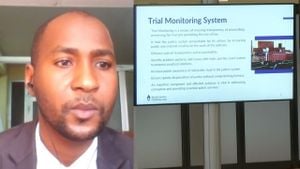Indonesian President Prabowo Subianto is on the move, turning heads on the international stage as he dives deep toward creating strategic alliances, especially focused on nuclear energy development and trade at the recent APEC summit held in Peru. Prabowo spotted the opportunity to attract the attention of major players like the United States, showcasing Indonesia's potential and its commitment to sustainable energy solutions.
Touching down at the Grupo 8 Alar Air Base of Jorge Chavez International Airport on November 13, 2024, the president made quite the entrance. He landed amid high hopes as the APEC Summit kicked off, where he would strategize with fellow leaders about uplifting economic ties across the Asia-Pacific region.
During his arrival, Prabowo was warmly welcomed by various dignitaries, including Peru's Minister for Agrarian Development Angel Manuel Manero Campos, the Indonesian Ambassador to Peru, and even military officials. After the traditional ceremonial greeting, marked by the presence of the ceremonial guard, he headed straight to his hotel with his entourage to prepare for the business at hand.
Before his arrival, Prabowo was busy in the United States where he had productive meetings with President Joe Biden at the White House. Their discussions were primarily centered around technology cooperation, particularly focusing on nuclear energy advancements, which are becoming increasingly relevant with current global energy demands.
The White House expressed strong support for Indonesia's initiative to incorporate small modular reactors (SMRs) within its energy infrastructure. SMRs are compact, innovative designs aimed at producing energy safely and efficiently, with individual units generating power of around 300 megawatts—much less than traditional reactors but with the added benefit of flexibility and lower financial risk.
According to the joint statement issued post-meeting, the two leaders agreed on expediting feasibility studies necessary for establishing these reactors, which holds promise for Indonesia as it pushes toward realizing its net zero emissions goal by 2060. Biden remarked on Indonesia’s pivotal role within the clean energy transition, highlighting its location and resources as integral to this global movement.
Interestingly, the move toward nuclear energy doesn't come out of the blue; it’s part of broader efforts to meet rising energy demands as the world faces potential shortages. Indonesia’s existing nuclear facilities, currently used for research purposes, are set to transition toward energy generation, seen as key to diversifying its energy mix.
One point of connection cited was Indonesia's past discussions with Russia about forming bilateral nuclear partnerships, which are now being revisited. Prabowo’s administration aims to make Indonesia not just a consumer of energy but also to place the country firmly on the map as one of the producers as global initiatives focus increasingly on energy sustainability.
At the APEC Summit, the theme “Empower, Include, Grow” encapsulated the focus on trade and investment expected to spur inclusive growth across the region. Trade Minister Budi Santoso indicated Indonesia's strong commitment to reinforcing the multilateral trading system within APEC's framework, underscoring the nation's aspirations to integrate its economy more holistically within global markets.
Beyond nuclear energy, Prabowo's presence at APEC also provided the platform to engage with various countries on trade matters, aiming to finalize significant deals, including the completion of the Indonesia-Peru Comprehensive Economic Partnership Agreement (IP-CEPA). Such agreements are expected to solidify Indonesia’s trade relationships, benefiting both sides economically.
With the winds of diplomacy blowing favorably for Indonesia, the nation is using such high-profile summits to cement its place as a forward-thinking, sustainable economy willing to collaborate with other nations to tackle global challenges. By advocating for clean energy and resource sharing, Prabowo is steering Indonesia’s image as not just another participant, but as a leader and innovator.
The alliance with the United States on nuclear development seems promising. It aims to cultivate local expertise by proposing nuclear research and training programs—elements deemed necessary for Indonesia to nurture its homegrown scientific community.
Looking at the broader picture, Indonesia is also eyeing partnerships with other economic entities, including BRICS and the OECD, as Prabowo emphasizes the urgency of establishing optimal prospects for growth and stability.
The emphasis on international cooperation, especially with major economies, indicates Prabowo's strategic approach to diplomacy—aligning Indonesia closely with countries willing to invest and facilitate technological innovation.
Dealings with corporate giants, such as ExxonMobil during his time stateside, reinforces how Prabowo's administration intends to strike lucrative partnerships. Engaging both private and public sectors lays down the groundwork for economic resurgence, especially amid challenges like inflation and market fluctuation.
The backdrop of the APEC Summit, coupled with burgeoning bilateral trade discussions, places Indonesia at the forefront of regional economic interactions. It pours new momentum over national policies aiming to revitalize sectors such as energy, agri-business, and technology, fostering confidence among investors.
Prabowo’s international foray isn’t limited to immediate economic benefits, it also specifies the broader goal: technological advancement, infrastructural development, and sustainable energy practices. This seeks to realize effective and inclusive growth targeted to address various socioeconomic crises faced by nations through cooperation and mutual interest.
Given the stakes, Indonesia seems poised on a path rich with opportunities contingent on how well it can leverage its international connections, especially during such pivotal moments as the APEC Summit. The upcoming discussions will rely heavily on strengthening bilateral agreements, focusing on nuclear energy work, and integrating advanced technology to fuel Indonesia’s march toward becoming a global player.
Overall, Prabowo's diplomatic moves symbolically echo the cries of many developing nations striving to put themselves on the map of global machinery. What remains enticing is tracking how these efforts manifest and the real fruits of these negotiations will become evident as the nation steps forward.



